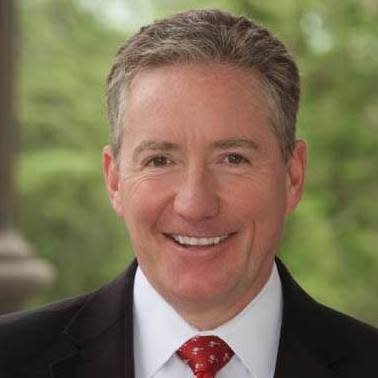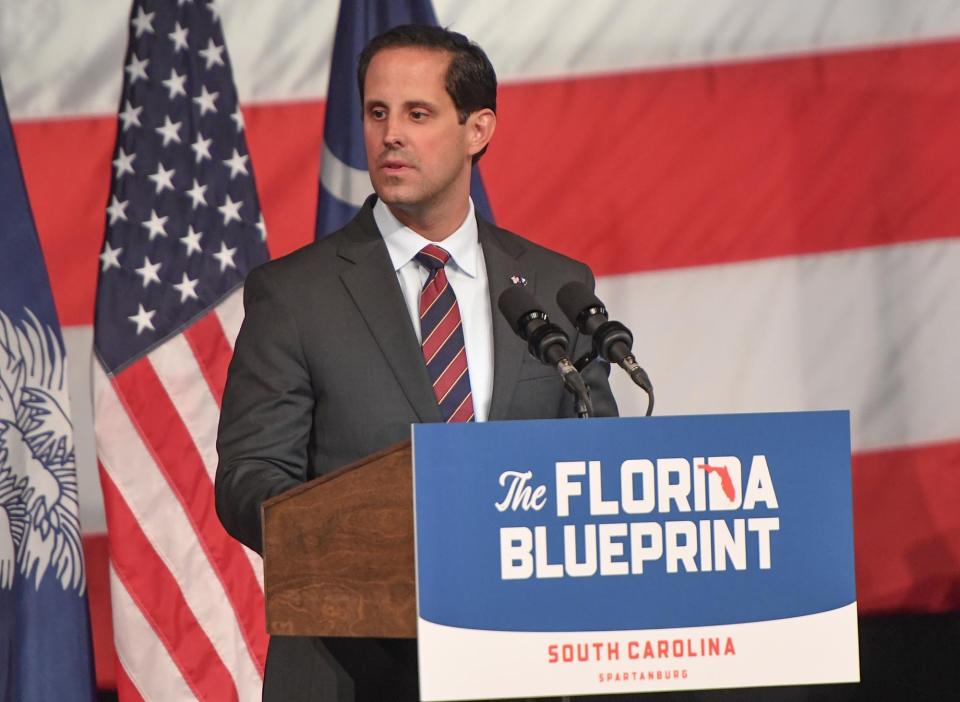SC Senate ignores calls for referendum, now one vote away from near-total abortion ban
- Oops!Something went wrong.Please try again later.
South Carolina is one final vote away from mandating a near-total abortion ban.
In an about-face for a chamber that has consistently rejected the same bill for the last six months and has instead rallied for its own six-week version, the Senate advanced the near-total abortion bill Tuesday, April 25, in a 22-21 split. The vote came minutes after an attempt failed to make abortion a referendum issue.
The current bill, H.3744, prohibits all abortions with exceptions for rape, incest and fatal fetal anomaly. Anyone who violates the proposed law will be fined $10,000 or get imprisoned for up to two years, or both. The bill also states a pregnant woman who has an abortion will not be criminally prosecuted or found civilly liable and mandates that the father pay child support. But it does place the burden of criminalization on the physician who performs the abortion.
The Senate will consider the bill again for a third and final vote Wednesday. If the bill passes, it will be sent to Gov. Henry McMaster's desk and is likely to become law.
If the Senate passes the bill, the state will join Mississippi to be the only other state with an abortion ban that allowed for exceptions. Other southern states such as Tennessee, Kentucky and Alabama have banned all abortions with no exceptions.
But the push and pull between banning abortion and reversing bans will be far from over because any abortion ban will almost always end up litigated. Some lawmakers are frustrated by the prospect of a continual back and forth.

Sen. Greg Hembree, R-Horry, who banded with Democrats and other GOP holdouts, introduced an amendment that would have changed the state constitution by making abortion a ballot question.
If the public were to give their assent or resist abortion access, then that would give the General Assembly the clear authority to regulate abortions in South Carolina, Hembree said.
"That authority is not clear right now. That's the problem," he continued. "We've been talking about the issues between the House and the Senate. That's not the larger issue. The larger issue is between the General Assembly and the state Supreme Court."
Hembree said the new SC Supreme Court could reverse their original position. But in the future, another judge could challenge that position. There had to be some consistency, he said.
"Women in South Carolina children, unborn children in South Carolina, people that are genuinely trying to decide what to do are going to be whipsawed back and forth based on the good or bad luck of who happens to be sitting on the Supreme Court at that particular moment," Hembree said.
Senate President Thomas Alexander, R-Oconee, ruled Hembree's amendment was not applicable to the legislation. This drew a lot of resistance from both Democratic and Republican lawmakers, some wanting to appeal the president's ruling.
South Carolina GOP infighting: SC Freedom Caucus wants to change policymaking. GOP Caucus concerned by tactics, direction.
Greenville County politics: America First group regains control of Greenville County GOP. Julian first Black woman chair.
Here's what happened Tuesday in the SC Senate
During Tuesday's debate, Senate Majority Leader Shane Massey, R-Edgefield, said the Senate's decision to prioritize the House's stricter abortion bill was due to an increase in the number abortions offered to out of state residents.
He said 87 abortions were performed on non-residents, between Jan. and March 2022. But in 2023, that number had risen to 1,385 in the same time frame. That increase in services bothered Massey, who added that stricter actions in other southern states, such as Florida, could make the state a destination for abortion procedures in the southeast.
Massey said abortion is a divisive issue, but he believes most state residents do not approve of the current 22-week law.
Sen. Sandy Senn, R-Charleston, questioned Massey.
"Do you believe that abortion is the number one problem facing the state of South Carolinatoday?" Senn asked.
Massey said he did not want to get into an argument and would only respond to questions directly related to the bill.
But Senn zeroed in on Massey's role in elevating the House bill.
"Can you tell me why we're taking it up for the third time in six months? If it's not the number one problem, has there been any other problem that we've taken up three times in six months?" Senn asked.
SC operatives: Nikki Haley, Tim Scott could be formidable. Will they get a big boost at home?
Massey refused to take any of Senn's questions.
Some lawmakers are concerned about provisions in the bill that had the potential to violate a rape victim's privacy rights.
Sen. Margie Bright Matthews, D-Colleton, said the bill was silent on what happens if a victim is unable to identify the perpetrator. She asked Massey if he was comfortable with law enforcement using the information to criminally charge a woman if the police officer believed she was not telling the truth or was failing to cooperate with law enforcement?
Lawmakers on the other side of the aisle resisted any implication that a woman could be charged. Spartanburg lawmaker Josh Kimbrell said the burden of criminality fell on the physician who he claims "profited" from providing abortion services.
In a back and forth, Massey and Kimbrell countered claims that their support of abortion bans was anti-woman. Rather, as Massey repeatedly said, this was to help women and save the lives of children.

Sen. Brad Hutto, D-Orangeburg, said lawmakers need to leave women alone.
"Did you know that most women would just ask you not to help them and just let them do what they want to do when they want to do it and make their own decisions for themselves without your help?" Hutto asked.
Association of American Medical Colleges data showed states that passed abortion bans this year experienced a 10.5% decrease in OBGYN resident applications.
Abortion advocates are urging senators to deny the passage of the bill in their next vote, which will be out of the norm as third readings are generally considered to be a cursory procedure.
"Politicians are attempting to force South Carolinians, including children, to give birth in a state with dangerously high rates of maternal and infant mortality and a shortage of OBGYN doctors — all of which get worse every year,” said Vicki Ringer, Director of Public Affairs for Planned Parenthood South Atlantic in a press statement.
Looking back at 2022 abortion ban votes in the SC House, Senate
Since the U.S. Supreme Court overturned Roe v. Wade, passing a stricter abortion ban has been a top priority for the General Assembly.
Attempts to pass a total abortion ban failed last year when female GOP Republicans, Sen. Katrina Shealy, R-Lexington, Sandy Senn, R-Charleston, Penry Gustafson, R-Kershaw, along with Sen. Tom Davis, R-Beaufort, banded together with Democrats.
They helped stall and ultimately kill a near-total abortion ban. Lawmakers tried to reach a compromise but ended the year with no resolution in sight.
The Senate did not have the votes to pass anything less than a six-week abortion ban.
This article originally appeared on Greenville News: Senate ignores calls for referendum, advances near-total abortion ban

